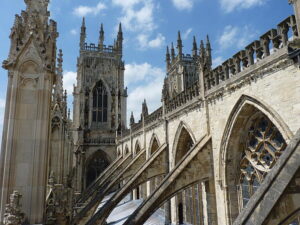Together, we are his house, built on the foundation of the apostles and the prophets. And the cornerstone is Christ Jesus himself. We are carefully joined together in him, becoming a holy temple for the Lord. –Ephesians 2:20-21
What would a network look like, and how is it different than a traditional understanding of church? These questions are often posed by other leaders, or those who have a history with the church. Understandably we are tired and slow to accept new models, having seen things come and go with little change. Below is a vision for 2025 and beyond, which would take a network of churches, organized around hub centres to realize city-wide change in our city. Give it a read, and let me know your thoughts!

Nanaimo is a growing city, a matrix of business, healthcare, and travel for the Central and North parts of the Island. One of the fastest growing metropolitan areas in the country, it is also the least-religious city in Canada. The churches in Nanaimo have historically struggled, despite some churches having been present for over a century. Despite the struggles of the conventional church, spirituality abounds in Nanaimo with thriving Wiccan covens, new age practitioners, and pseudo-spirituality permeating the population.
Now is the time to ask ourselves these questions: Can this city change? What is Jesus doing here?

The Journey Here
For Christ Community Church, the community finds itself in a pivotal, potentially transformational time. Having survived a theological siege and leadership crisis, the 40 who remain are beginning to look to the future and ask, “What’s next?” The years that preceded the split were filled with hemorrhaging as families and individuals fled the congregation sensing the relational and spiritual tension in the community for greener pastures.
What may not be immediately evident is the broader pattern of the church of Nanaimo. There is historical evidence to demonstrate that just as a community is on the precipice of a missional breakthrough, moral, spiritual, theological, or relational catastrophe strikes and the sheep scatter to other congregations until a similar event happens there. We must pause and recognize the powers and principalities that are rooted in this geographical location, to see the power they influence on the city, and to put on our spiritual armour.

For 1700 years, the Church has enjoyed the favour of the world. The first 300 years of the Christian Church involved suffering, persecution, death, and an underground network of believers who saw an explosion of the church as they gathered around tables. When Emperor Constantine announced his sweeping edict that Christianity was now the official religion of the Roman Empire, things drastically changed: wealth consolidated into the church (who owned ~10% of all property in the Roman empire), clergy suddenly enjoyed significant social status, and it became culturally advantageous to ‘follow’ Jesus.

The centuries that followed are largely marked by nominalism in the church. Certainly, in the medieval times, the structure of the church held the larger culture together, but also unleashed the crusades upon the world. The form of Christianity that prevailed was ill equipped to spiritually combat the onslaught of Islam as it spread. Rather than a radical obedience to God, the church settled for a heretical pluralism, welcoming pagan beliefs into her walls.
Even as the Reformation swept through the Church in the 1500s, the clergy who abandoned the Roman Catholic church retained much of the structure and beliefs from whence they came. The church remained a structured institution – with the exception of the Anabaptists. The Anabaptists were hunted down by Catholic and Protestant alike, fleeing to other countries from drowning and worse because of their radical communal beliefs.

Our modern church is marked by radical shifts in the 1980s, where a ‘seeker-friendly, growth-minded’ church put the numbers in the pew above all else. Suddenly, creating a palatable Gospel for the masses, mixed with modern music styles, coffee bars, and leaning heavily on programs became the standard. Hundreds of thousands came to church, often for the first time.
However, it wasn’t until the 1990s when sober evaluation of those who were church goers revealed that most did not believe Jesus died on the cross, or understood the significance of the life of Jesus at all. The Bible had been boiled down into a moralistic teaching providing a framework for good living, blessing, and social community.
Is it any wonder that we’re struggling to respond to the issues of our day?
For Nanaimo Today

It is my honest sense that God is going to war for our city. The Spirit has turned His gaze upon Vancouver Island, and is inviting His Church into partnership to declare war on the powers and principalities that have enjoyed authority on this part of the world for far too long. There is a deep hunger in the general population for truth, but they have no way to discover it.
The churches have codified a Sunday Morning service as the primary vehicle for people to engage with God. The vast majority of individuals will only darken the doors of a church building for weddings or funerals, with walls and protections that would shame Alcatraz. For those that brave the culture shock of Sunday, they are asked to make the translation into the church’s worldview to discover who God is.
For many churches, retaining 100+ bodies on a Sunday morning allows for a meagre salary for a pastor, programs, and the keep the church building heated and lights on. The most successful churches in Nanaimo would boast ~300 people on a Sunday morning and be elevated as the most successful among us. Individuals will shift from church to church based on who speaks to them the most, provides the best programs for their families, and has the best worship program.
Many churches expect their pastors to preach the Word of God on Sunday morning, counsel with the wisdom of Solomon, administrate their humble kingdom like a Fortune 500 CEO, and manage their affairs with deft grace. The congregation participates as the pastor sets vision and direction through volunteering and giving. When things go wrong, however, it can take decades for a community to recover.
Is this what Jesus demonstrated for us? Is this what he called the disciples to?
Moving to Network
Matthew 28 gives us the Great Commission: “All authority in heaven and on earth has been given to me. Therefore go and make disciples of all nations, baptizing them in the name of the Father and of the Son and of the Holy Spirit, and teaching them to obey everything I have commanded you. And surely I am with you always, to the very end of the age.”
A bold calling to his disciples to recognize that no power or principality can stand against Him any longer. The King is seated on the throne, and judgement has come for all those who have oppressed His loved ones. Yet the time has not yet come for a final judgement, because humanity is still under the spectre of sin and brokenness. So Jesus commissions his disciples to go. To make disciples, baptize, and teach them to obey his commandments. Notably, they do not do this alone, but with the presence of Christ to the very end.
This radical commandment led all but one disciple to be martyred for the cause. Christians were brutally killed, ostracized, and left destitute; Yet the church exploded. They had a wealth that the world could not compete with, and a Gospel that called people home out of their pain.
This was a movement that was marked by a radical level of commitment to Jesus, and an immense amount of freedom in how the mission was carried out. Some distributed food, others clothes; those that owned property opened their homes for the local church, while others were gifted to teach and preach. Every city looked different as they contextualized the Gospel to their local culture.
This is possible today. A community marked by individuals who are unified in mission towards a common cause and values, and free to move out into the world in radically different ways. Unleashing individuals to believe again that the Spirit is enough, discover their calling, and empowering them to live it out.
Rather than huddling together a hundred believers for two hours one morning a week, this model has the potential to reach thousands of people right in their homes, at the intersection of their workplaces, and in the moments of crisis and need. Those who would never darken the doors of the church are introduced to the Living God through His followers offering grace in the day to day of life.

Imagine a network of 1000 small churches, laid out on the tapestry of Nanaimo, each with a unique mission and equipped to care for the needs of those they meet. It is not unreasonable to see the entirety of Nanaimo have a conversation with a follower of Jesus every month.
- When there is a death, the Church is aware and present
- For those shut-in who never leave their home, God’s eyes are upon them, and the Church is able to bless them with relationship and help
- For the sick, the Church is able to bring healing
- For the unseen, God directs His people to open their eyes and respond by meeting the real needs of these people
It is possible to see a revolution of change in Nanaimo in our lifetime, a city transformed by the Gospel. This is a time to explore if God is calling you to do something radical with Him, and leave a legacy that will bless generations to come.
The Hub
The hardest shifts in this journey is to move our conception of a church building from sanctuary and asset to a community resource and opportunity to serve our community, from a singular church to a multitude of churches that welcomes in a wide umbrella under common values.
To steward our resources not from a scarcity mindset, which tells us that we have to protect what we have because there is not enough, but from an abundance mindset that recognizes God spoke the universe into being and can give infinitely. Therefore, we are able to give away what He has given us freely to see His Kingdom come, because there is always enough.

A hub model would be a focal point for missional activity in the city. Rather than offices and sanctuary, a building becomes an incubator for business, a sanctuary for the lost and broken, a resource for Kingdom activity, a bastion of prayer, and a barracks for warfare. The walls of the building would welcome in a multi-denominational church who share theological and missional values to equip all followers of Jesus to discover their calling, speak the Gospel, and live the Kingdom in their everyday lives.
This model would dialogue with the broader city not to offer programs, but to ask, “How can we serve you?” It could take on forms like a commercial kitchen that is available to food the poor and unhoused, a shelter that is equipped and secured to welcome in those who need help in the crossroads of life, common workspaces for entrepreneurs to mingle and work on new businesses to benefit the city, a cutting-edge meeting space to foster community events and elevate Kingdom ideals, and so much more. Rather than offering ‘merely’ spiritual programs throughout the week, the hub would become a nexus of training for the Kingdom of God in Nanaimo, sending missionaries into the city to see the Kingdom come on earth as it is in heaven.
Other Shifts
You may be asking at this point – but how does this work and hold together? It requires further shifts in our thinking that can happen gradually over time. The work of the network can be housed under two major umbrellas: a nonprofit that exists to serve the Church, and the churches themselves.

The nonprofit provides the framework, support, and structure for budding missionaries. There is coaching, accounting, web design, community, conferences, spiritual formation, facilities, media support, and more to enable missionaries to discover, focus, and realize their mission. This nonprofit would host optional events throughout the year to equip the churches to live out their mission, and fertilize the soil to promote flourishing growth.
The churches would be governed by a council of Elders, who ensure the theological integrity of the network, and offer advice and oversight to the individual churches and missionaries. As regions emerge, they would have their own group of elders who handle the day-to-day ministry and accountability in their region, answering questions that may arise. In this way, we follow the model that Moses established with the Israelites.
Rather than a centralized administrative vision, a group of codified common values determines the direction of the network. Inside of these fence posts, there is a high degree of freedom for individuals to follow the calling of God on their lives. No person is an arbiter of what ‘works’ or ‘does not work’ – the network enables all who agree with the common values to go and live out their mission. Failure is not shunned, and some callings may run their natural course of time.
Does This Mean…
… that there will no longer be a Sunday Service? No. For the saints who are blessed by the traditional service, the community should continue to offer that service to them, blessing them, encouraging them, and also equipping them to live out their calling. The service’s focus does change however, from being a potential outward, ‘sticky’ service, to being one for the equipping and calling of believers. As the network grows, gathering the network together is a natural (and needed) part of the health of the churches, providing larger-scale worship, testimonies, encouragement, and space to minister to one another.
… we give up control? Yes. The theological distinctives provide a fencepost around freedom, and guide theological orthodoxy in conjunction with the council of Elders. What happens in each individual church is up to that missionary, and a diversity of expression is not only to be expected, but encouraged.
… I would not know every person in our network? In all likelihood, yes. As the Gospel spreads throughout our city, the network does not lean on a single individual or small group of people. Instead it is unleashed to spread virally throughout every crevice of our city and beyond. It is the Spirit, our values, and mission that bind us together in a common cause.
… the shift needs to happen suddenly? No. In my experience it takes a minimum of 18 months for a ‘churched’ Christian to make these shifts. Teaching and organizational shifts would begin to equip the believers with needed skills, call them to mature into Spiritual Parents, discover their God-given calling, and live it out. This time would be to help those who come from a traditional model make the shift, while those without the history can immediately start living in the new reality.
… we could reach all of Nanaimo? Absolutely, I sincerely believe this is possible in our lifetime. In my work with leaders around the world, I’ve seen thousands of villages reached in an accelerated time frame by loosening the chains of control, and allowing new believers to boldly go forth to preach and live the Gospel in networks that are traditionally closed to the Church. We welcome the advantage of multiplicable growth, where 1 person welcomes 4 new believers, who each welcome 4 others, who welcome… (and in 4 generations we have 500+ new believers in the family, as the ‘parents’ continue to share their faith).
… the staffing model would change? In all likelihood, yes. Gifted individuals who serve in the administrative side of things helping to keep books for the churches, providing media support, coaching, and organizing events. The spiritual side would fall to the Elders (with some overlap) to teach, preach, lead, and stewards the network. There could be some full-time staff, but it also opens the door for bi-vocational, and support raising individuals to serve the broader community.
Capturing a Holy Imagination
When we stand at a crossroads, it can be incredibly difficult to have a holy imagination for what God is doing. We are in crisis, and hoping to survive the next year, let alone flourish in the decades to come. There is an invitation here to dream big with the Spirit, capturing His imagination for a city that is not only surviving, but thriving and free because of the establishment of an outpost of the Kingdom.
Jonah did not believe that Nineveh could ever change, yet as he walked the streets preaching the coming judgement, a repentance broke out in the hearts of the citizens and change happened. The Spirit was present, fighting for these people, and it took only one (reluctantly) obedient individual to unleash blessing. How much more does our Father envision a whole network of believers living their calling every day, reaching the lost, the poor, the broken, giving freely of themselves knowing that their home is not here.
Can this city change? Can you sense how God is already moving?
